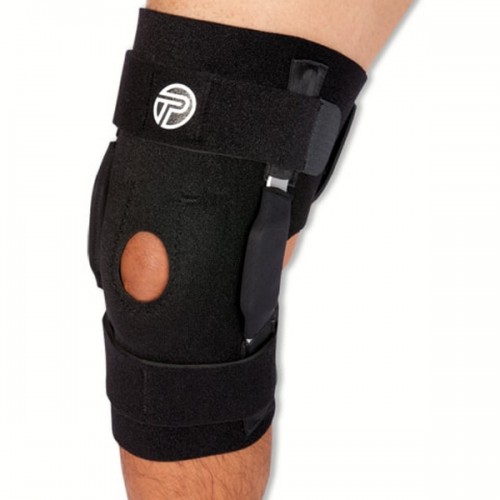Specification
Description
Hinged neoprene wrap features:
1) Flexible straps that will not bind or "dig" into skin
2) Dual axis hinges for medial and lateral stability
3) Component parts allowing full range of motion without compromising stability or support.
4) Popliteal opening to prevent bunching and discomfort behind knee
Medical Applications: Effective, form fitting support for patellar tracking issues, moderate ligament and meniscus tears, overall knee joint stability and hyperextension.
Sizes:
Medium: Up to 19"
XLarge: 19"-24"
Patellar Subluxation and Dislocation
Medical Definition: Subluxation - The patella partially coming off of its track.
Dislocation - The patella entirely coming off of its track.
Causes: Patellar Subluxation may be caused by Iliotibial Band Syndrome, trauma-such as a twisting injury, or general malalignment of the patella. Patellar Dislocation is usually due to a traumatic injury - such as a blow to the knee.
Symptoms: Pain in the patellar region.
Recommended Treatment: R.I.C.E. - Rest, Ice, Compression, Elevation. Strengthening of surrounding muscles to help absorb shock to the knee. A proper stretching (Quadriceps, Iliotibial Band) routine is highly recommended pre and post workouts. Apply Ice for 10-15 minutes after each workout to reduce inflammation and pain. (If any skin irritation or adverse reaction occurs due to icing, see your medical doctor).
Ligament Injuries
Anterior Cruciate Ligament (ACL) injury:
Medical Definition: Tearing of the ACL. The ACL is a ligament that connects the tibia to the femur and is necessary to help stabilize the knee joint area. Causes: ACL injuries may occur in many different situations but are often caused by a sudden hit to the knee or a pivoting (change in direction) injury.
Symptoms: Pain (will vary depending on injury severity) and swelling. Instability to the knee joint area.
Recommended Treatment: ACL injuries demand immediate medical attention. Depending upon the severity of the injury, surgery may be required. Range of motion exercises, ice and physical therapy are recommended before and after surgery (if required).
Medial Collateral Ligament (MCL) injury:
Medical Definition: Tear to the medial collateral ligament. The MCL is located on the inside of the knee, while the lateral collateral ligament(LCL) is located on the outside of the knee. Injury to the MCL is more common than injury to the LCL.
Causes: Twisting injury to the knee or a blow to the outside of the knee, often occurring in sports.
Symptoms: Pain and swelling. Requires evaluation by a medical professional.
Recommended Treatment: Follow advice from a medical professional. MCL injuries are usually not as serious as a ACL injury.
Meniscal Tear
Medical Definition: Tear to either the medial or lateral meniscus. The meniscus is the shock absorbing cartilage in the center of your knee.
Traumatic Cause: A sudden hit to the outside of the knee area may cause a tear to the meniscus.
Degenerative: Over time the meniscus may deteriorate or soften, increasing the likelihood of injury. In this case, a sudden twist or turn may cause injury.
Recommended Treatment: Reduce activity to promote healing. Ice, as recommended by a medical professional. Certain stretching and strengthening exercises may be beneficial. Wearing a knee support may provide some warm, compression and stability to enhance the healing process. As with any orthopedic injury, please seek a complete evaluation from a medical professional.
Tags: Pro-Tec, Knee Wrap, Patellar, moderate, ligament, meniscus, hyperextension, small, large, extra large, XX large, XXL, XL, x-large, knee

